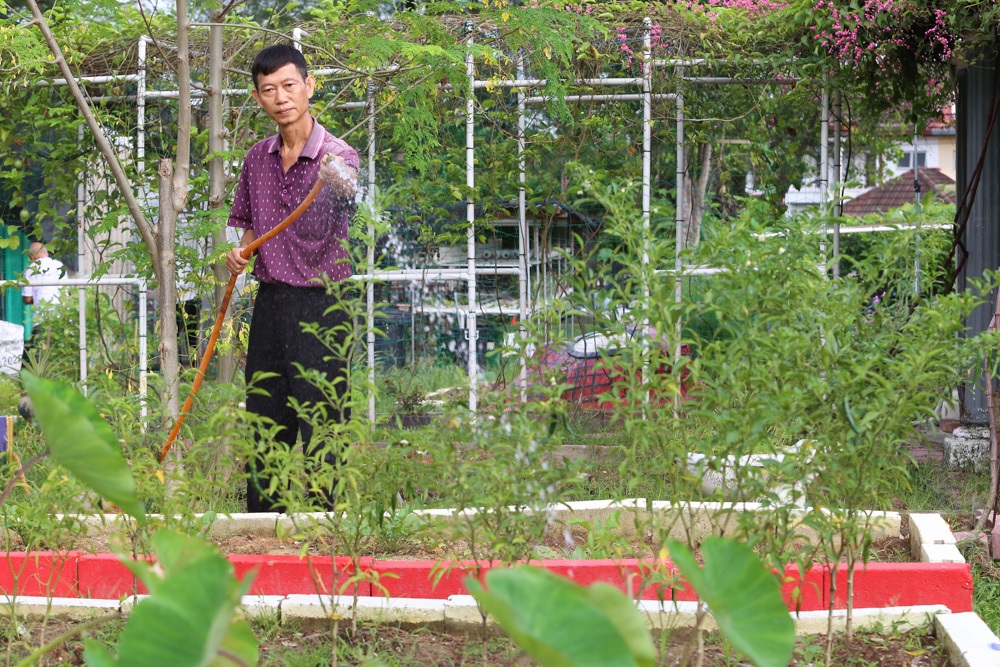PETALING JAYA, Dec 30 ― If there was one thing the pandemic taught many people around the world ― besides the importance of handwashing ― it’s that the act of growing your own food can be comforting in times of uncertainty.
In the UK, gardening became the second most popular lockdown activity in the after watching television as many were forced to stay to curb the spread of Covid-19, a GlobalData survey found.
Now that gardening is back in trend, community gardens in the Klang Valley have blossomed into launching pads for those tinkering on the idea of being self-sustainable once the movement control order (MCO) eased up.
As these green spaces become more vital for many urban dwellers to access organically grown produce, especially during a pandemic, Malay Mail spoke to two Klang Valley community gardens to find out more.

Kebun Komuniti USJ 12
At Kebun Komuniti USJ 12, a dedicated group of retirees have worked tirelessly to transform an abandoned plot next to a playground into a thriving community garden that has its own hydroponic system and rain harvesting facility.
Pre-MCO, the flourishing suburban oasis was home to a wide variety of crops such as mustard leaves, spinach, kangkung and low maintenance crops like lemongrass, pandan, yam, mint and sweet potato leaf.
There are even pineapples, a longan tree and a beehive that produces honey.
The green patch not only provided residents with organically grown herbs and vegetables at a small fee but a social space for seniors to make better use of their time.
“The mission of this garden is to bring the community closer,” said the garden’s treasurer Karen Tan, 60.
Like many community gardens that rely on volunteers, it isn’t always easy getting the residents involved and the maintenance can be strenuous for the seniors.
“We have problems attracting people to join in.
“We’re getting old but we want to maintain it for the community,” said president Izzaham Idris, 53.
He added that the garden, which is endorsed by the Subang Jaya City Council (MBSJ), wouldn’t have been able to thrive without the support of Subang MP Wong Chen, Subang Jaya assemblyperson Michelle Ng and MBSJ councillor Lee Jen Uyin.

When the MCO was announced in March, it became a challenge watering the plants.
They also found out people were stealing lemongrass and pandan so they decided to leave the garden alone.
“We also stopped doing gotong royong (community cleanup) and any gatherings and got tasks done in small groups to observe Covid-19 safety measures,” he added.
And then a lightbulb moment happened ― Izzaham and his team decided to change things up by renting out the plots to interested residents.
Tenants can plant any crops they wish and whatever they harvest is theirs.
“We’re like the landowner,” he joked.
“We now have less maintenance and work, we’re only in charge of the common areas ― it’s a win-win situation.”
To their surprise, the 20-plus lots were taken up by the residents like hot cakes.
At a modest RM5 to RM10 per month depending on plot size, it was an offer that was hard to refuse.
But with the new norm, tenants can only work on their plots in small groups to maintain physical distancing protocols.
“Each of them had different reasons why they wanted the plots.
“We wanted to refund their money during the conditional movement control order as some might not want to go out but surprisingly, no one took back the money,” he said.
Address: Kebun Komuniti USJ 12, Jalan USJ 12/2F, Subang Jaya.

TTDI Edible Community Garden
The team at TTDI Edible Community Garden found the initial stages of the MCO to be a challenge because they weren’t sure if they could visit the garden to tend to the produce.
“We checked with officials but there were no replies,” Taman Tun Dr Ismail resident Kee Joo Yee told Malay Mail.
The former financial analyst was part of a group of volunteers who banded together to resuscitate an abandoned community farm on Lorong Burhanuddin Helmi that now grows an exhausting list of produce including bananas, papaya, ginger torch flower, turmeric and seasonal greens.
When they finally got to the garden, most of the crops were dead or on their last legs from water deprivation and overgrown weeds took over the entire place.

Due to the farm’s proximity to the Bukit Kiara forest reserve, their visitors include a variety of birds including kingfisher, bees, garden lizard, butterflies, odd-looking bugs and cats occasionally.
They’ve also encountered snakes at the farm that spans more than 16,000 sq ft.
“Although they are dangerous, the snakes are at the garden or crawling inside our residences because they have ‘nowhere’ to go – we have stolen their habitat and are continuing to do so,” Kee added.
“Adding to the challenge, we do not have many active volunteers and during the MCO, some of the volunteers could not come to our garden as they are living outside of TTDI.

“So there was more work to do but less manpower,” Kee said.
The volunteer-run garden provides the community with fresh, chemical-free produce that is available for sale on Saturdays (9.30am to 12pm).
Post-lockdown, the edible garden has been getting more attention and Kee hopes it will inspire others to start their own edible garden.
“As you eat what you grow, you will be more conscious of the materials that you use i.e., more organic and less chemical fertilisers,” said Kee.
“Community gardens provide not just food security but also build community togetherness.”
Address: TTDI Edible Community Garden, Lorong Burhanuddin Helmi 11, Taman Tun Dr Ismail.






















